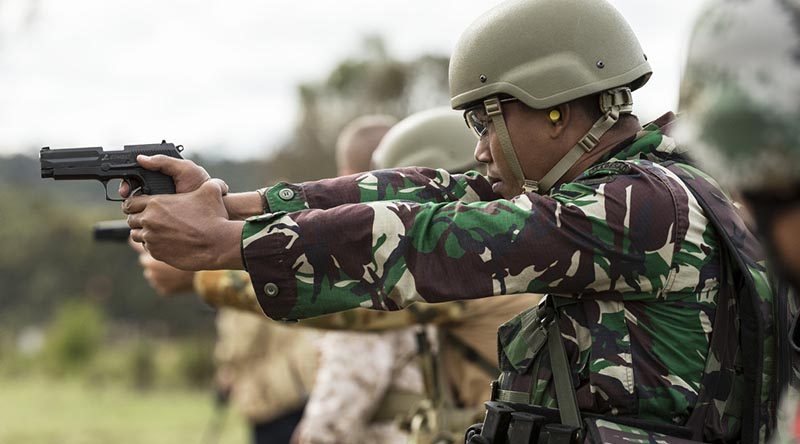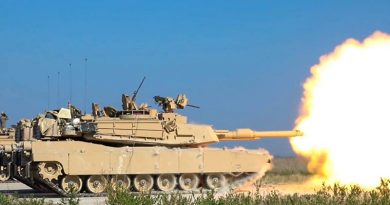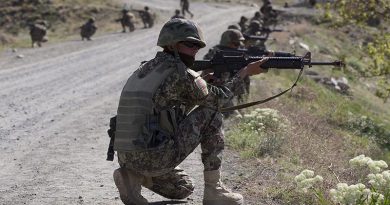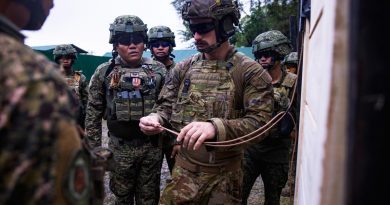LOST IN TRANSLATIONS – the great Indo/Aussie tiff of January 2017
Share the post "LOST IN TRANSLATIONS – the great Indo/Aussie tiff of January 2017"

Late last year following a training opportunity with SAS in Western Australia, an Indonesian TNI officer reported to his commanders back in Indonesia that he was concerned about some teaching materials and remarks he observed while on course.
FILE PHOTO: An Indonesian soldier competes in the Australian Army Skill at Arms Meeting at Puckapunyal, Victoria, in May 2016. Photo by Sergeant Janine Fabre.
Ripples of disquiet subsequently rumbled up the chain of command in Indonesia and a CDF (equivalent) to CDF complaint was formally made.
The Australian Chief of the Defence Force Air Chief Marshal Mark Binskin gave his Indonesian counterpart, General Gatot Nurmantyo, an undertaking that the matter would be addressed seriously and an inquiry would be instigated.
Apparently, Indonesia informed Australia that defence cooperation between the two countries would be suspended – although, even in this, there was some breakdown in communications, as only some interactions between the two Defence organisations were postponed while others went ahead as planned.
In the mean time, while high-level efforts to resolve the issue continued throughout December, including over the Christmas/New Year period, the incident blew up into a full-blown diplomatic issue after the story broke in the media in Indonesia and here in Australia.
Even then, the story developed and evolved somewhat over the course of 24-hours, on 4/5 January 2017, as Australian Defence Minister Marise Payne went on a media binge…
Official Press Statement put out by the Minister on 4 January at 6pm:
Late last year concerns were raised by an Indonesian TNI officer about some teaching materials and remarks at an Army language training facility in Australia.
The Australian Chief of the Defence Force, Air Chief Marshal Mark Binskin, wrote to his Indonesian counterpart, General Gatot Nurmantyo, giving an undertaking that this matter would be addressed seriously and we would inquire into issues raised.
The Australian Army has looked into the serious concerns that were raised and the investigation into the incident is being finalised.
Indonesia has informed Australia that defence cooperation would be suspended. As a result, some interaction between the two Defence organisations has been postponed until the matter is resolved. Cooperation in other areas is continuing.
Australia is committed to building a strong Defence relationship with Indonesia, including through cooperation in training. We will work with Indonesia to restore full cooperation as soon as possible.
In October 2016, at the 2+2 Foreign and Defence Ministers’ Meeting in Bali, Indonesian Defence Minister Ryamizard and I had discussions about the issues that are important to both of our defence organisations and our future areas of cooperation.
Further, following the release of the 2016 Defence White Paper, my first visit was to Indonesia to meet with Minister Ryamizard.
Defence cooperation takes place within the broader context of the Australia-Indonesia relationship, which is in very good shape with extensive cooperation across a wide range of government agencies.
Sky News interview with Marise Payne, Defence Minister, about Indonesia-Australia military ties – morning of 5 January 2017:
HELEN DALLEY: Well joining me live now to discuss our top story this morning is Defence Minister Marise Payne, and we’re very pleased that she made time to join us. Marise Payne, thanks for joining us.
MARISE PAYNE: Good morning Helen, how are you?
HELEN DALLEY: I’m well. Now, how serious is this row, this rift with Indonesia’s military?
MARISE PAYNE: Well Helen, we’ve indicated that of course we take the concerns that have been raised with us very seriously. But, given the depth and the breadth of our relationship, whether it’s in cyber-security, counter-terrorism, the Bali Process and countless other areas, I think that if we work through this methodically and we deal with the concerns that were raised through the TNI that we’ll be able to restore our relationship in Defence activities to where it was relatively easily.
HELEN DALLEY: All right, so you don’t actually have any news on that front right now? You haven’t been able to restore the relationship so far?
MARISE PAYNE: Well we’ve been talking with the relevant Indonesian officials, both their Chief of Army and their Chief of the Defence Force equivalent from our side, and doing that since concerns were raised in late November. We indicated that we would institute an inquiry, which the Chief of Army, Lieutenant General Angus Campbell, did. That is close to finalisation and once we have that finalised and we present those results to the Indonesians and talk that through with them, I think that will be the beginning of that process. That said …
HELEN DALLEY: [Interrupts] All right, but that does beg the question that Australia’s- you know, we committed to do an investigation into this. That is still ongoing, and yet there is a rift because the Indonesians cancelled cooperation, they suspended the ties.
MARISE PAYNE: Well they have suspended some cooperation, other activities are still occurring. For example, the Chief of the Indonesian Air Force visited Australia just in December, and our co-chair with Indonesia of an ASEAN Defence Ministers Plus Working Group on peacekeeping activities visited Indonesia in late December. So there are a number of things which are still occurring, there are some which have been suspended. They indicated that, out of concern for the issues that they had raised in relation to the training activities in Western Australia, that they would suspend some activities. We knew that was occurring and we are managing the inquiry process now.
HELEN DALLEY: How would you describe what is happening now?
MARISE PAYNE: Well I would describe it as unfortunate; I, in fact, wish that it had not occurred. I think it would be far preferable if these sorts of issues were not a concern between us. But that said, I think the maturity of the relationship, the depth of the relationship means that we will be able to work through this process, and I look forward to, in fact, a positive outcome in due course. I think due course needs to be allowed to run through though, because it is important that process is seen to be observed.
HELEN DALLEY: All right. Would it be fair to say that perhaps the Indonesians felt that due course wasn’t happening fast enough? I mean, how did it escalate to this point where they haven’t waited for the results of our investigation and they have suspended ties with Australian military cooperation?
MARISE PAYNE: Well I think that is a decision the Indonesians took. Clearly we have been in regular communication from army to army and military to military. I have been in contact with my Defence counterpart in Indonesia, Minister Ryamizard Ryacudu. He’s in fact indicated that he intends to visit, at my invitation, Australia indeed in February. So from that perspective we have been communicating regularly. I think though that the concerns that were raised are ones which we have taken seriously, and ones which we are dealing with seriously.
HELEN DALLEY: All right. So how did this all start? The concerns that were raised, were they from, as we understand it, a Kopassus trainer who was in Australia, he took offence at some of the training materials that were saying principally that West Papua was part of Melanesia and really wasn’t part of Indonesia, and took great offence at that?
MARISE PAYNE: There are a number of issues which appear to have been raised out of the training program in Western Australia, and they are part of the inquiry process which the Chief of Army is undertaking. I’m not going to prejudge those or canvas the issue. I don’t think that’s appropriate given we have a military inquiry underway.
HELEN DALLEY: [Talks over] So you know what the issues are, but- sorry, you know what the issues are but you’re not going to tell us what the issues are that caused this offence, to cause this suspension of military ties with one of our biggest and nearest neighbours?
MARISE PAYNE: Well some of them have been canvassed in the media as you know …
HELEN DALLEY: [Talks over] So they’re true?
MARISE PAYNE: … but I don’t think that it helps to re-ventilate those ad nauseam, and I think it is important to allow the inquiry to run its course.
HELEN DALLEY: All right. So you say there were a number of factors. I mean, there are reports that Australia tries to poach Indonesia’s best soldiers. I mean, can you say whether that might be the case and that perhaps that really peeved them, but also that there may be concerns at the increased numbers of US troops in the north of Australia?
MARISE PAYNE: I’ve heard some of those reports this morning, and there is no basis in fact for concerns about poaching – or whatever term one would want to use – of Indonesian soldiers in that regard. I have in fact discussed the marine rotation with my counterpart at a number of meetings in the past and have had no concerns raised with me. The marine rotation is something which we spoke with Indonesia about once the decision-making was finalised, alerted them, advised them of it, and I am comfortable with the understanding between the Indonesian Government and our Government in relation to the marine rotation. We know that our joint efforts across the Indo-Pacific are vital to peace and to stability in this region – that includes Indonesia, it includes Australia, it includes the United States and a number of other parties, and that is a very well-understood aspect of our relationship.
HELEN DALLEY: So Minister, just to be specific and clear, you say the issue of the troops, increased numbers of US Marines in the north of Australia being rotated through has been raised with Indonesia before and they have not raised any concerns with Australia or with you?
MARISE PAYNE: That’s right. That was part of the process of consulting across the region. Of course once the decisions were made our neighbours were advised. And let’s be clear: the marine rotation has been underway for some years now. It’s not a new occurrence and is something which has been very important in the region. In terms of our relationship with Indonesia, we have a very open and frank defence relationship. I have met several times with my counterpart. In fact, after the Defence White Paper was launched in February of last year the two visits that I made immediately after its launch were firstly to Jakarta, secondly to Kuala Lumpur, recognising the importance of both Indonesia and Malaysia in regional terms to us and to our activities more broadly. So these sorts of matters are things which we discuss regularly. The Foreign Minister and I attended a two plus two meeting with our Indonesian counterparts in Bali just at the beginning of November, if I recall correctly last year, a very important meeting with a focus on a number of things: on the Bali Process, on our efforts in cyber-security, and most importantly on our joint efforts in counter-terrorism, and particularly in addressing the challenge of returning foreign fighters from the Middle East, which is one which plagues both Indonesia and Australia as we well know, and one which we take very seriously.
HELEN DALLEY: Yes, so those sorts of cooperative ties will continue, but who ordered this suspension then? If you say that it’s being dealt with at the highest levels, was it- there is talk that it was more a low level reaction, but who ordered the suspension? This is a major change in our relationship, it must have been done at a high level, surely?
MARISE PAYNE: I understand it to have been a direction from the TNI commander, the CDF equivalent – Chief of the Defence Force equivalent – and one which we have been corresponding with Indonesia about since that time. The Chief of Army has an arrangement underway to meet with his counterpart, and once the inquiry is finalised and those matters can be spoken about with Indonesia we’ll take it from there.
HELEN DALLEY: All right, and just finally, those planned upcoming shared military operations, what of them now?
MARISE PAYNE: Well I would hope that we can still proceed with those, and we have had preparatory meetings for that, and that’s a matter which I’ll be working with the ADF on.
HELEN DALLEY: All right, Minister Marise Payne we do thank you for your time and for putting that in some perspective. Appreciate it.
MARISE PAYNE: Thank you very much, Helen.
.
Defence Minister Marise Payne held a press conference in Sydney about noon on 5 January to discuss the issue of “Australia’s Military partnership with Indonesia”
MARISE PAYNE: Ladies and gentlemen, I want to start by reinforcing the importance of the Australia-Indonesia military relationship, and the relationship more broadly. It’s one which spans many decades. We first sent a Defence attaché to Jakarta in the 1950s, and it’s one which has been of significant personal importance to me since I was appointed the Defence Minister. In fact, just in October the Foreign Minister and I, Julie Bishop, met with our counterparts in Bali for a two plus two ministerial meeting which canvassed some of the key issues of the relationship: regional maritime security, cyber-security, counter-terrorism, the Bali Process itself. All of these things underpin the depth and the strength of the military relationship.
We have had an issue in recent times in relation to some training materials, which is what we’re here to talk about today. That is one which I hope we can deal with in a constructive and mature way, and move on from that to reinforce the importance of what we do together, and I’m very happy to take a couple of questions.
QUESTION: Senator, why did it take you so long to get to the bottom of this, given the fact it’s a fairly simple issue? Why has it taken one month for the ADF to [indistinct] conclusion as to what actually occurred?
MARISE PAYNE: Well, I think if you understand that the concerns were raised through TNI and then back to the Australian military at the end of November and then the beginning of December. The chief of the Indonesian military wrote to the CDF on 9 December. The Chief of Army here in Australia, Lieutenant General Angus Campbell, instituted an inquiry; that inquiry is underway. It has had to receive information from the Australian side, from the Indonesian side. To be fair, I think you would also appreciate that we have had the Christmas and New Year period as well, but it is very close to finalisation. When that is finalised we will go back to the Indonesians with that and proceed from there.
QUESTION: The Indonesian media has reported that an Indonesian soldier has seen a laminated piece of paper with the words Pancagila instead of Pancasila. Is this report wrong, and if so how?
MARISE PAYNE: There are a number of reports floating around, as is often the case. I’m not going to canvas those particular aspects, they are obviously part of the inquiry. Once that is finalised then we will take that to the Indonesians and take things from there.
QUESTION: [Inaudible question].
MARISE PAYNE: The issue of West Papua was raised by the Indonesian Defence Minister, yes. I think he indicated that in his post-meeting comments. We of course, in accord with the Lombok Treaty, which is the treaty between Australia and Indonesia, recognise Indonesia’s sovereignty and territorial integrity and that is our firm and stated position.
QUESTION: [Talks over] Minister, [indistinct] training material contain a reference to West Papua [indistinct]. Was it an official document, or something that [indistinct]?
MARISE PAYNE: So as I’ve said, those are matters which are part of the inquiry instituted by the Chief of Army. It would not be appropriate for me to canvas those before the conclusion of the inquiry, and I don’t intend to do that.
QUESTION: [Indistinct] that Australia [indistinct] Indonesia [indistinct]?
MARISE PAYNE: I’ve heard that that has been reported. That is clearly not the case, and not a matter which I think merits significant canvassing.
QUESTION: Do you think the Indonesians are overreacting, especially in relation to [indistinct]?
MARISE PAYNE: Well it is a matter clearly of significant concern. A representative of the TNI, an officer of the TNI, raised his concerns with senior officers when he returned to Indonesia in late November, so I take that seriously. Of course I take that seriously, as much as I take the relationship seriously, and to do otherwise would be not appropriate. So that is a matter for the Indonesians; they have raised these concerns, they’ve taken the steps that they’ve indicated they think are appropriate. I’d have to say at this point that although some activities have not occurred, others have. So the chief of the Indonesian Air Force visited Australia in December, the Australian co-chair of the Australia-Indonesia chairmanship of the ASEAN Defence Ministers Plus Working Group on Peacekeeping visited Indonesia in very late December. So there are still two-way activities occurring. Some have been suspended and others are occurring.
QUESTION: [Inaudible question].
MARISE PAYNE: Well the Chief of the Defence Force, Air Marshal Mark Binskin, has a very constructive relationship with General Nurmantyo. He has been working with him for some time now. I have a great deal of respect for the General and the way in which he works with his military. We have significant military to military contacts and I am confident that the CDF will continue that constructive relationship.
QUESTION: Do you want to see the head of army apologise to any Indonesian figures, to military or the [indistinct]?
MARISE PAYNE: Certainly we have indicated our regret that this occurred and that offence was taken. I think that’s appropriate when a significant counterpart raises their concerns with you, no matter who it is. We obviously work very broadly regionally and internationally, and we should endeavour to ensure that the material we use is culturally appropriate, is to the point, not gratuitous, and I’m sure that those are matters which will be taken into account in the preparation of training material into the future, and in fact I will ensure that that is the case.
QUESTION: Has the material been removed?
MARISE PAYNE: The material has most certainly been removed. As I said, the training is not currently occurring and I expect that it will be replaced with appropriate material in due course.
QUESTION: [Indistinct] someone on the level of TNI commander who could actually suspend operations to this degree?
MARISE PAYNE: Well I think perhaps, in terms of saying a TNI commander, we’re actually talking about General Nurmantyo who is the chief of the Indonesian Defence Force. This is a military to military concern which he has raised. We are dealing with it in both that context, in the diplomatic context, and in the minister to minister context. I think that’s an appropriate way to deal with it.
QUESTION: [Inaudible question].
MARISE PAYNE: As I said, the inquiry is still underway and once that is finalised, which is imminent, then the Chief of Army will deal with those matters. It’s not for me to intervene in that.
QUESTION: How many Indonesians have been withdrawn from Australia?
MARISE PAYNE: A relatively small number.
QUESTION: Just the one barracks in question, or others [indistinct]?
MARISE PAYNE: The participants in that training course, as I understand it.
QUESTION: Minister, is General Nurmantyo still [indistinct]?
MARISE PAYNE: Yes.
QUESTION: When did the Government first find out about this [indistinct]?
MARISE PAYNE: The concerns were raised in late November and early December and there was an indication that some activities would be suspended in those discussions.
QUESTION: Can you explain the contradiction between the comments from [indistinct] comments and the head of the army in Indonesia? Why do you think that they’re saying separate things, or is this a unilateral action from the Indonesian military?
MARISE PAYNE: I don’t think it’s for me to speculate on that, but the president of Indonesia and the Defence Minister have made their views clear in media commentary today, and I will continue to work with my counterpart, the Prime Minister will continue to work with his, our senior military leaders will continue to work with theirs. The most important thing is to complete the inquiry, to respond to Indonesia with those outcomes, and then to proceed to restore the relationship and the interaction as best as we can.
QUESTION: Minister, [indistinct] the inquiry and when will it be finished?
MARISE PAYNE: I’m advised by the Chief of Army that that is imminent. I believe it to be an administrative inquiry, but I’m sure further details will be made available once that’s complete. Ladies and gentlemen, one more question.
QUESTION: How is it, Minister, that the asylum seekers [indistinct] by the Indonesian military [indistinct]?
MARISE PAYNE: Well I think that that is an indication of some of the very important aspects of our relationship. The Minister for Immigration overwhelmingly deals with that issue of course, but the Prime Minister, the Foreign Minister and I are in regular communication with our counterparts on that. We have no indication of any change in that regard, and I don’t expect there to be. As I’ve said, we have an issue in this context, in the military context; we are working very hard to overcome that and to restore the relationship.
Thanks very much ladies and gentlemen, don’t get too wet.
.
.
.
.
.
.
.
.

.
.
Share the post "LOST IN TRANSLATIONS – the great Indo/Aussie tiff of January 2017"







Why does Australia have to tell Indonesia all about our defence plans and get their approval before we implement them? Surely Indonesia is evidently only a fair weather friend who receives free military hardware from Australia and then feigns insult seeking Australia to apologise on bended knee. It seems most evident to me that Australia has no guts at all and squirms to Indonesia for fear of upsetting them over the smallest trifle. It also appears evident that Indonesia’s war fighting skills are lacking and their air force always crashing! Will Australia now replace their lost 5 Hercules with ours to curry their favour?